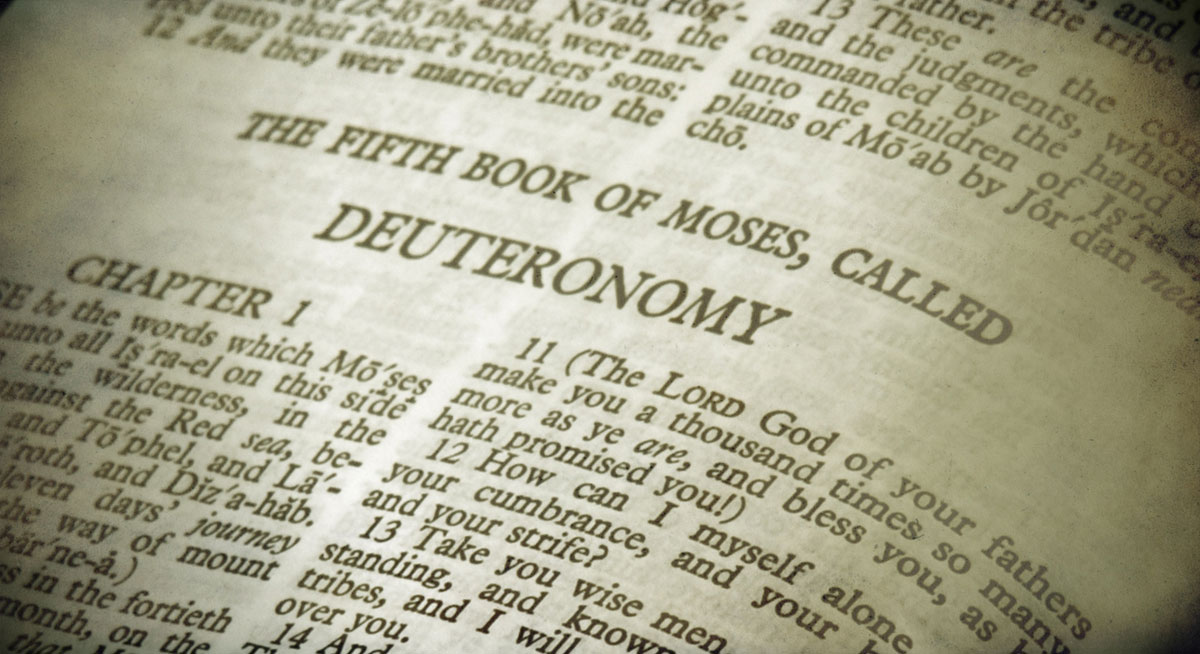
The Know
While making repairs to the temple in Jerusalem in the 7th century BC, workers discovered a copy of a book called “the book of the law” and gave it to the high priest Hilkiah (2 Kings 22:8). He, in turn, showed it to Shaphan the scribe, who read the book to King Josiah (v. 9). But “when the king had heard the words of the book of the law … he rent his clothes” in grief, knowing that he and his people had not kept the laws in this book (vv. 11–13).
Shortly after this, King Josiah initiated a series of reforms based on what was in the book (2 Kings 23:3–15). Most scholars now agree that the book the king was so worried about was the book of Deuteronomy.1 Because Deuteronomy was so important in Jerusalem during Lehi’s time, it makes sense to assume that it would have been important to the writers of the Book of Mormon as well.2
One way in which Deuteronomy influenced the Book of Mormon is that the Book of Mormon uses a large number of short phrases from Deuteronomy. For example, Deuteronomy 11:1 commands the people to keep God’s “statutes, and his judgments, and his commandments.” Helaman 15:5 similarly commands people to keep “his commandments and his statutes and his judgments according to the law of Moses.”
1 Nephi 4:34 uses Deuteronomy as well. It states, “Surely the Lord hath commanded us to do this thing; and shall we not be diligent in keeping the commandments of the Lord? Therefore, if thou wilt go down into the wilderness to my father thou shalt have place with us.” This is likely a reference to Deuteronomy 6:17, “Ye shall diligently keep the commandments of the Lord your God, and his testimonies, and his statutes, which he hath commanded thee.” These are not the only examples of shared phrases. Based on research done by Book of Mormon Central Staff, at least 52 different phrases from Deuteronomy appear throughout the Book of Mormon.3
Deuteronomy influenced the Book of Mormon in other ways as well.4 Deuteronomy 17:14–20, for example, gives laws about how kings should behave. These laws are referenced throughout the Book of Mormon.5 Deuteronomy 17:15 states, “thou shalt in any wise set him king over thee, whom the Lord thy God shall choose: one from among thy brethren shalt thou set king over thee.” Mosiah 2:9–11 notes that the Nephites set a king over themselves that was chosen by God from among their brethren, just as it states in Deuteronomy6. Drew Briney has noted more than 200 scriptural passages in the Book of Mormon that reflect these kinds of similarities between Nephite laws and the laws of Deuteronomy.7
The Why
Because the Book of Mormon begins in Jerusalem in 600 BC, and because Deuteronomy was an important text in Jerusalem during that time, the use of Deuteronomy in the Book of Mormon is a subtle indication of its authenticity. The numerous relationships between the two books also show us how the Nephites incorporated some of the timeless truths of Deuteronomy into their lives, teaching us how we can do the same.
For example, Deuteronomy tells us that good leaders should care more about knowing and keeping the commandments than they do about money or possessions (see Deuteronomy 17:14–20). King Benjamin clearly took this counsel to heart (see Mosiah 2:10–13). His life is an example of how we can apply Deuteronomy to ourselves and become better leaders. Another example is in Deuteronomy 31:9–13, which tells people that they should make the scriptures a focal point of their lives. Alma 5 gives practical ways in which people can make this ideal a reality in daily life.
Another doctrine, found in Deuteronomy 6:7–9, states that parents should teach the commandments “diligently unto thy children, and shalt talk of them when thou sittest in thine house, and when thou walkest by the way, and when thou liest down, and when thou risest up.” Alma 36–42 is an example of how Alma obeyed this commandment and shows us how we can fulfill this commandment today as well.
When we understand how the Nephites lived the commandments contained in Deuteronomy and applied its teachings to their own lives, we can have a better idea of how we can apply Deuteronomy to ourselves as well, allowing it to become an important source of insight into how we can live better lives today.
Further Reading
David Rolph Seely, “Presentation on Deuteronomy in the Book of Mormon,” presentation given at BYU Law School, November 18, 2015, online at archive.bookofmormoncentral.org.
Noel B. Reynolds, “The Israelite Background of Moses Typology in the Book of Mormon,” BYU Studies 44, no. 2 (2005): 5–23.
Noel B. Reynolds, “Lehi as Moses,” Journal of Book of Mormon Studies 9, no. 2 (2000): 26–35.
- 1. See Mordechai Cogan, “Into Exile: From the Assyrian Conquest of Israel to the Fall of Babylon,” in The Oxford History of the Biblical World, ed. Michael D. Coogan (New York, NY: Oxford University Press, 1998), 243.
- 2. For more on this, see David Rolph Seely, “Presentation on Deuteronomy in the Book of Mormon,” presentation given at BYU Law School, November 18, 2015, online at archive.bookofmormoncentral.org.
- 3. From Book of Mormon Central, “Deuteronomy in the Book of Mormon,” unpublished paper in our possession.
- 4. For more on Deuteronomy in the Book of Mormon, see Book of Mormon Central, “How Do the Covenants in the Scriptures Apply to Me Today? (Mosiah 7:25),” KnoWhy 369 (October 3, 2017).
- 5. From Drew Briney, “Deuteronomy’s Influence on Nephite Jurisprudence,” unpublished paper in our possession. See also Taylor Halverson, “Deuteronomy 17:14–20 as Criteria for Book of Mormon Kingship,” Interpreter: A Journal of Mormon Scripture 24 (2017): 1–10.
- 6. See Briney, “Deuteronomy’s Influence.”
- 7. See Briney, “Deuteronomy’s Influence.”
Continue reading at the original source →



